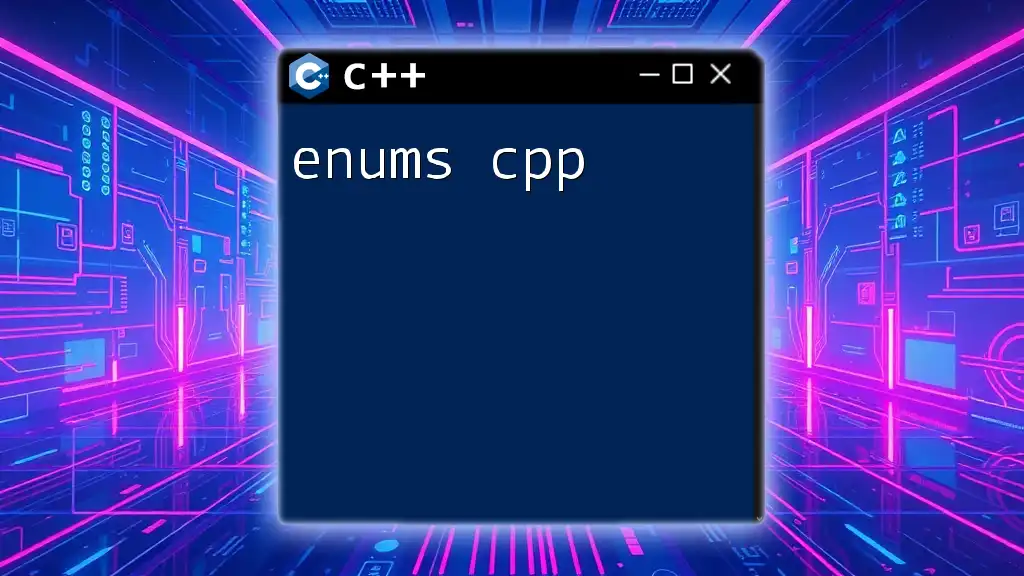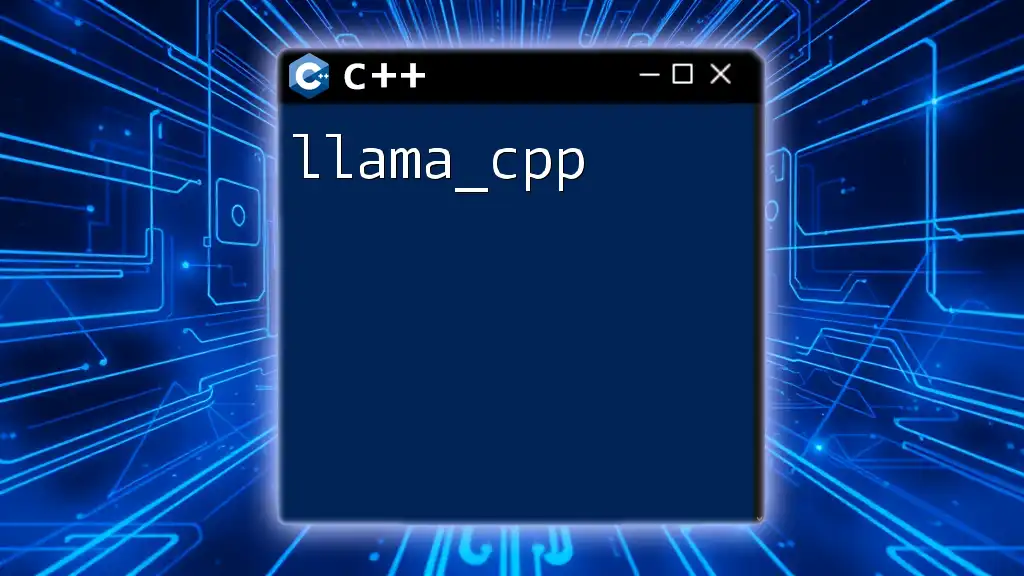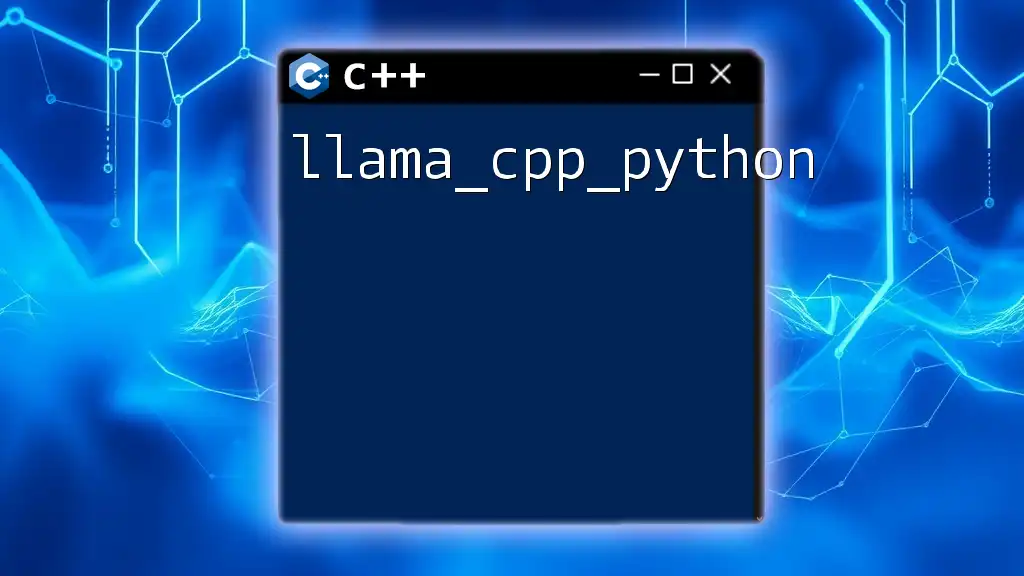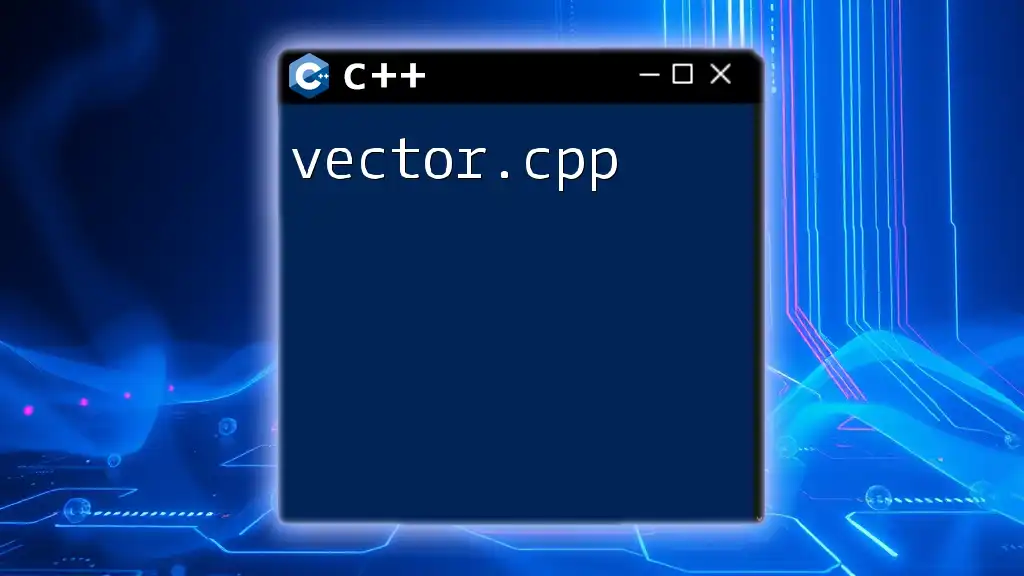In C++, enums (enumerations) are a user-defined type that consists of a set of named integral constants, allowing for more meaningful code representation.
enum Color { Red, Green, Blue };
Color myColor = Green;
What is Enumeration in C++?
In C++, enumeration or enums provide a way to define a variable that can hold a set of predefined constants. This allows for more readable code and improves type safety by ensuring that variables are assigned values that are meaningful in the given context. By using enums, programmers can easily manage sets of related constants, making their code cleaner and more maintainable.
The Enumeration Data Type in C++
The enum data type in C++ transforms a set of related named constants into a single data type. This helps eliminate the risk of using arbitrary integer values in your code, enhancing both the clarity and robustness of your programs. For instance, instead of using integer literals (like 1 for `Monday`, 2 for `Tuesday`), you can use named constants, thereby improving readability and maintainability.
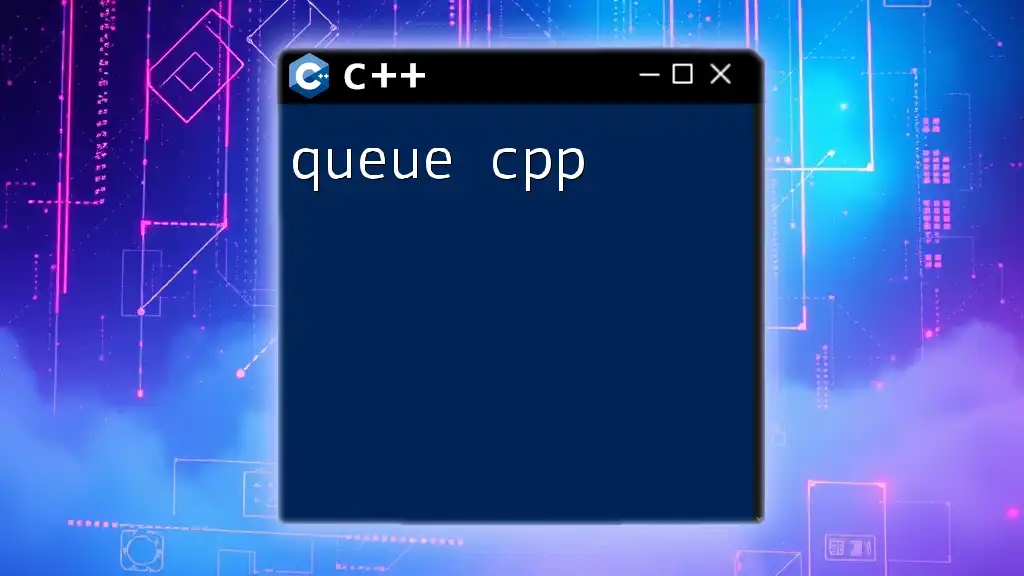
Understanding C++ Enums
What is Enum in C++?
An enum allows you to define a collection of named integer constants. By default, the first constant has the value of 0, and each subsequent constant is assigned a value that increments by 1. However, you can also assign specific values to the constants.
Here’s a simple example of enumeration:
enum Day {
Monday,
Tuesday,
Wednesday,
Thursday,
Friday
};
In this example, `Monday` is assigned the value of 0, `Tuesday` 1, and so on.
How to Define an Enum in C++
Defining an enum is straightforward. The syntax consists of the `enum` keyword followed by the name of the enumeration and a list of enumerators enclosed in curly braces. For example:
enum Color {
Red,
Green,
Blue
};
Here, `Color` is an enumerated type, and `Red`, `Green`, and `Blue` are the enumerators.
C++ Enum Type
The C++ enum type allows you to use cleaner names in your code instead of arbitrary integers. You can use them in variables, function parameters, and returns. For instance, consider this usage:
Color myColor = Red;
By using enums, developers can instantly recognize that `myColor` is meant to hold a color value, providing clarity to the code.
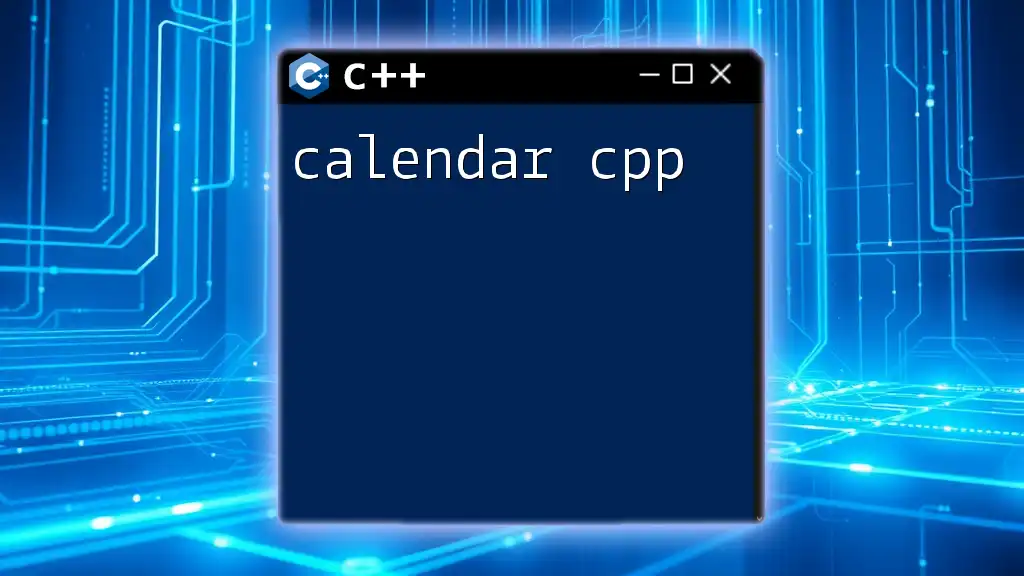
Using Enums in C++
How to Use Enum C++
Enums are not just for decoration; they serve practical purposes. They can be used in conditional statements, switch cases, and even as function parameters. This enhances the program's readability and makes it easier to manage states or categorizations.
For example, using enums within a switch statement makes the code more intuitive:
enum Direction {
North,
South,
East,
West
};
void move(Direction dir) {
switch (dir) {
case North:
// Logic for moving North
break;
case South:
// Logic for moving South
break;
case East:
// Logic for moving East
break;
case West:
// Logic for moving West
break;
}
}
CPP Enum Example
Consider this more comprehensive code example that includes an enum for representing vehicle types:
enum VehicleType {
Car,
Truck,
Motorcycle,
Bicycle
};
void printVehicleType(VehicleType type) {
switch (type) {
case Car:
std::cout << "This is a Car." << std::endl;
break;
case Truck:
std::cout << "This is a Truck." << std::endl;
break;
case Motorcycle:
std::cout << "This is a Motorcycle." << std::endl;
break;
case Bicycle:
std::cout << "This is a Bicycle." << std::endl;
break;
}
}
// Usage
VehicleType myVehicle = Car;
printVehicleType(myVehicle);
Enum in C++ Example
Enums can also be used within classes to encapsulate related named constants. Here’s an example:
class TrafficLight {
public:
enum Light { Red, Yellow, Green };
Light currentLight;
TrafficLight() : currentLight(Red) {}
void changeLight() {
switch (currentLight) {
case Red:
currentLight = Green;
break;
case Green:
currentLight = Yellow;
break;
case Yellow:
currentLight = Red;
break;
}
}
};

Enumerators in C++
What are Enumerators in C++?
Enumerators are the named constants defined within an enum. Each enumerator represents a unique value associated with the type defined by the enum. They enhance code readability and maintainability by giving meaningful names to constant values that would otherwise just be numbers.
Best Practices with Enumerated Types in C++
To make the best use of enums in your projects, consider the following practices:
- Always use `enum` instead of integer literals for representing a set of related values.
- Prefer the use of `enum class` ( scoped enums) for better type safety.
- Name your enums clearly to convey their intended role.
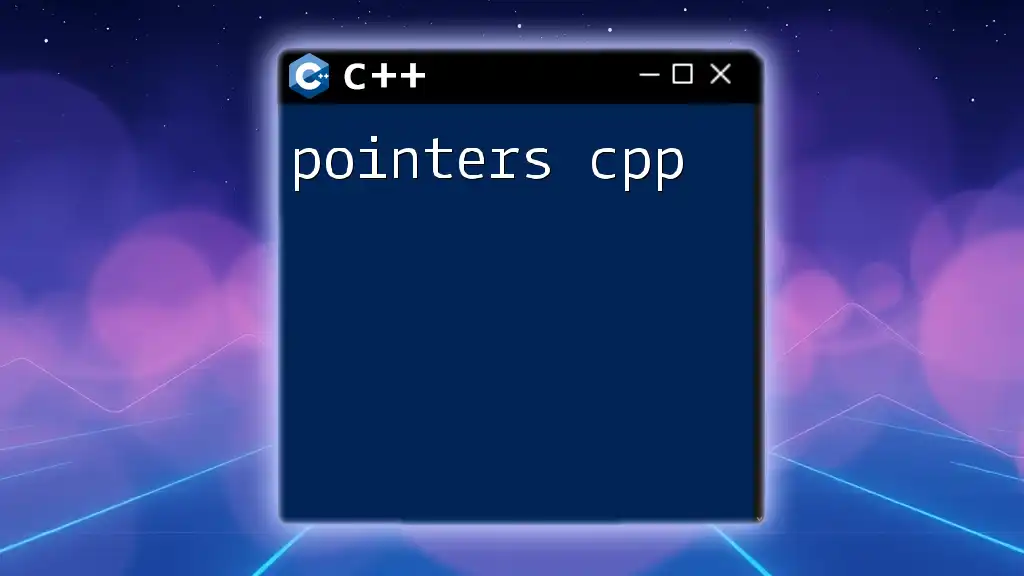
Advanced Features of Enums in C++
Enum Class in C++
With C++11, a new scope of enums—the `enum class`—was introduced. This allows you to define an enumeration that does not implicitly convert to its underlying type. It helps prevent name clashes in larger codebases.
Here’s an example of using an `enum class`:
enum class Color {
Red,
Green,
Blue
};
Color myColor = Color::Red; // Scoped usage
Using `enum class`, you cannot accidentally assign an enum value to an integer, which promotes type safety.
Implicit and Explicit Conversion in C++ Enum
By default, enumerators are implicitly convertible to integers. For example:
enum Status {
Pending,
Approved,
Denied
};
int statusCode = Pending; // Implicit conversion to integer
However, with `enum class`, explicit conversion is needed. This prevents accidental misuse of enum values.

Enumeration in C++ vs. Other Languages
Comparing C++ Enums with Other Programming Languages
While many programming languages support enums, C++ enums stand out due to their flexibility and the introduction of scoped enums. Here’s a brief comparison:
- C#: Enums are also strongly typed and support flags.
- Java: Enums can have methods and constructors, making them more powerful than C++ enums.
- Python: Introduces the `enum` module for flexible enumerations.
C++ Enumerated Data Type Best Practices
To use enumerated types effectively:
- Define enums when you need a variable to hold a set of related constants.
- Consider using scoped enums to avoid name clashes and enhance type safety.
- Maintain clear naming conventions for enumerators to increase code clarity.
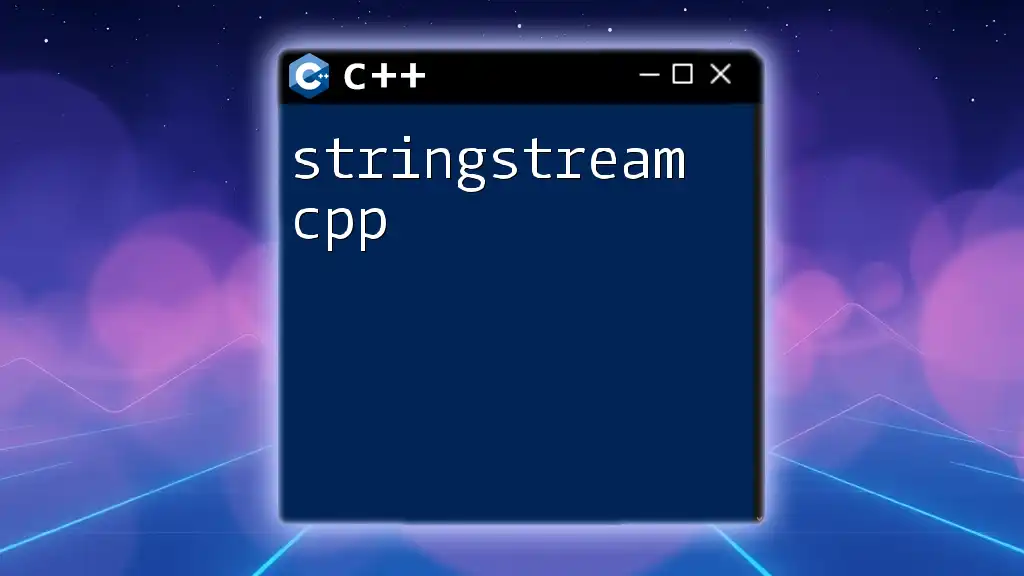
Summary
In this article, we've explored the world of enums in C++. Starting from their basic definition to practical usage, we delved into advanced features like `enum class` and type safety issues. The main takeaway is that utilizing enums allows developers to write cleaner, more maintainable, and type-safe code.
Encouragement for Further Learning
I encourage you to experiment with enums in your projects. Creating various enums will not only improve your understanding but also assist you in writing cleaner code. For further learning, utilize resources that dive deeper into C++ programming and its features.

Conclusion
Enums in C++ are powerful tools that allow for cleaner, more maintainable code by providing a way to work with named constants. Understanding and effectively utilizing enums can significantly enhance the quality of your programming practice. Embrace this feature to elevate your coding skills!

